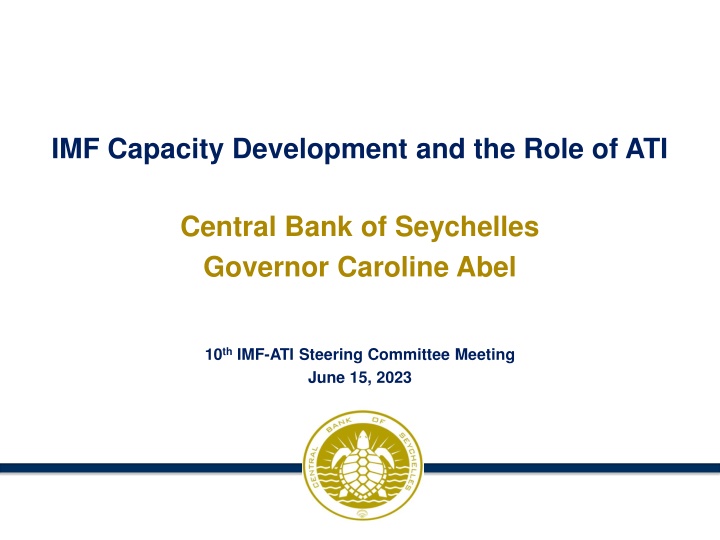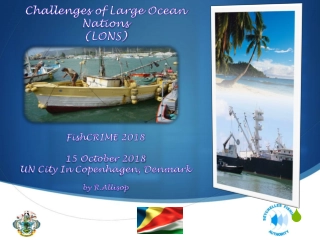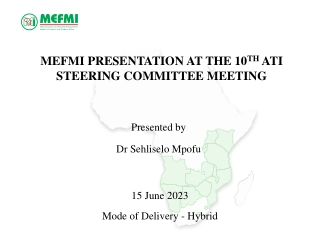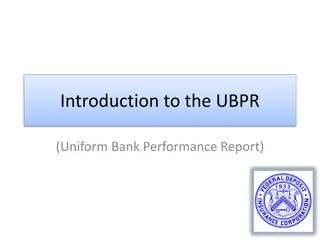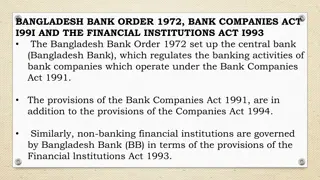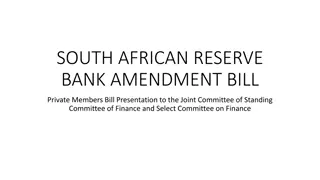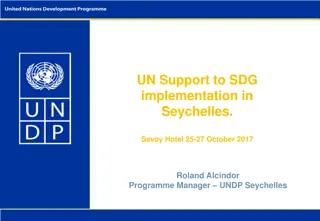Seychelles Central Bank Governor's Experience with IMF-ATI Capacity Development
Seychelles Central Bank Governor, Caroline Abel, shares her enriching experience from participating in the IMF-ATI training courses. She highlights the knowledge gained, skills acquired, and the dissemination of insights within her team. The training courses covered diverse topics such as monetary policy, bank supervision, and financial sector policies, leading to enhanced technical capabilities and improved engagements. The Governor's active participation in peer exchanges and workshops reflects her commitment to continuous learning and professional development.
Download Presentation

Please find below an Image/Link to download the presentation.
The content on the website is provided AS IS for your information and personal use only. It may not be sold, licensed, or shared on other websites without obtaining consent from the author.If you encounter any issues during the download, it is possible that the publisher has removed the file from their server.
You are allowed to download the files provided on this website for personal or commercial use, subject to the condition that they are used lawfully. All files are the property of their respective owners.
The content on the website is provided AS IS for your information and personal use only. It may not be sold, licensed, or shared on other websites without obtaining consent from the author.
E N D
Presentation Transcript
IMF Capacity Development and the Role of ATI Central Bank of Seychelles Governor Caroline Abel 10th IMF-ATI Steering Committee Meeting June 15, 2023
Overview of Seychelles engagement with ATI Institutions and agencies Examples of courses attended oMinistry responsible for Finance oBank restructuring and resolution oCentral Bank of Seychelles oCompilation of Balance of Payments statistics oSeychelles Revenue Commission oFinancial programming and policies oNational Bureau of Statistics oFiscal Frameworks oFinancial Services Authority oNational Accounts statistics oPublic Enterprise Monitoring Commission oMonetary and exchange rate policy Participants by gender Applicants by gender Success rate Male, 30% 394 Male, 33% Applicants Female, 70% Female, 67% 182 Participants Source: Africa Training Institute
CBS experience from ATI training courses Enhanced knowledge and technical capabilities Peerexchange Soft skills acquired Discussed how different economic theories may materialise Monetary policy under different exchange rate regimes Networking Sought clarifications from peers Improved understanding of specialised topics Financial sector policies Bank supervision Forecasting and Policy Analysis System (FPAS) Monetary Policy Improved internal and external engagements Teamworking Public speaking skills Time management Better confidence Gained insights on other country experiences Microfinance in different countries Used in day-to-day operations Compilation of relevant sectoral statistics e.g. monetary and BOP Used for in-house training Knowledge shared with team members Literature used as reading materials Peer-to-peer lending Identified custom solutions Developed country-specific baseline and alternate scenarios as part of monetary policy discussions
Dissemination of knowledge gained o Overview of training courses and information gathered are shared with other team members Monetary policy forecast rounds Inputs or guidance provided during technical discussions, may lead to revisions being made to operations or working files o Training report is produced recommending the implementation of new ideas/knowledge derived from the specific courses o Knowledge gained is incorporated in internal manuals and/or guidelines o Methodologies learned are featured and explained in working papers o Country experiences are shared in workshops CBS experience on FPAS shared in the ATI Peer-to-Peer Workshop on FPAS
Importance of ATI training as part of CBS Capacity Development Strategy o Trainings focus on areas that are very relevant to our deliverables e.g. compilation of statistics and policy aspects o Development tool that can be used across various levels of staff experience i.e. from entry level and onwards o Staff who are new to certain roles can gain knowledge and build capacity in key areas to better fit their new role o Workshops and seminars which primarily consists of country case studies, provide useful insights
Role of hybrid, blended and virtual modes of training Hybrid, blended and virtual modes ensured training and engagement continued during the pandemic Virtual format allowed staff who are unable to attend in-person training to benefit from the opportunity Virtual mode of training was most effective for workshops and seminars which does not usually require interaction between participants Blended or hybrid approach is more suitable for more technical topics which benefits from interaction between participants
Conclusion The Central Bank of Seychelles, as well as other institutions and agencies in Seychelles have and continue to benefit from the ATI courses and widespread knowledge and skills of the professionals delivering those training. The wealth of knowledge available at ATI through lectures, group sessions and interactions with the facilitators, allows for staff to develop their technical capabilities and skills. We look forward to the continuous collaboration and further building of capacity of the staff as the global and local economies continue to develop, something which brings both opportunities and challenges.
